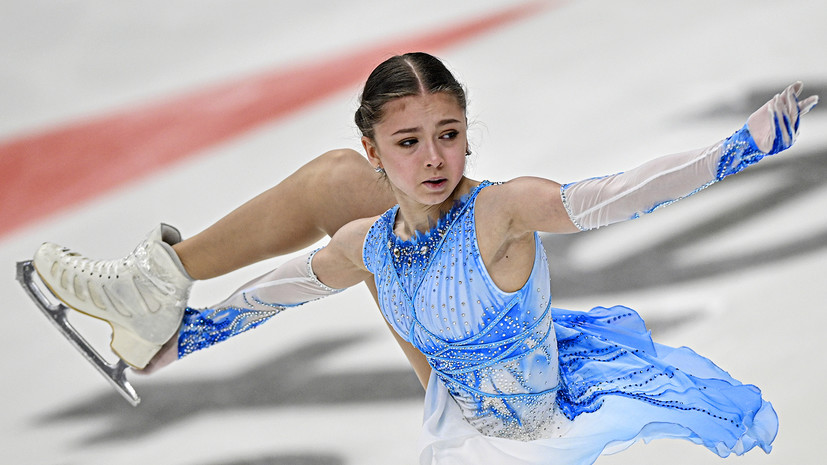Dancing on Ice
The composition of the participants of the fifth stage of the Russian Cup was the poorest in comparison with the previous starts.
Many stars were forced to withdraw due to coronavirus and other diseases.
Ice dancing was particularly hard hit.
The winners of the Russian stage of the Grand Prix Victoria Sinitsina and Nikita Katsalapov refused to compete due to pneumonia in their partner, and Alexandra Stepanova and Ivan Bukin still cannot recover from their illness.
As a result, only five dance pairs entered the Megasport ice, where the entrance to spectators was closed - this is usually enough for one warm-up in this discipline.
In this quintet, Anastasia Skoptsova and Kirill Alyoshin stood out.
Since their victory at the 2018 World Junior Championships, they have been trying to gain a foothold in the top three couples in the country and have not turned off the path to that goal.
In Moscow, the duo performed their familiar rhythm dance to the music of Bonnie and Clyde.
Despite the absence of spectators, the couple performed very fervently, and there were almost no technical flaws on their part.
Skoptsova and Alyoshin scored 81.81 points - only Sinitsina and Katsalapov scored more for rhythm dance in the Russian Cup.
Only Sofya Eremenko and Igor Shevchenko could compete with the pair, but the separation on the step path deprived them of several points and sent them to second place with a score of 76.39 points.
Sports couples
Another significant loss to competition occurred in sports pairs.
The winners of the Moscow stage of the Grand Prix, Alexandra Boykova and Dmitry Kozlovsky, were on the list of participants to the last, but literally a few hours before the short program, they withdrew because of their partner's cold.
This opened the way to the first place for other students of Tamara Moskvina Anastasia Mishina and Alexander Gallyamov.
With a number to the music from the ballet "Esmeralda", they have not yet known defeats this season, but at the same time they have never received a grandmaster grade of 80 points from the judges, which is the basis for all the best couples in the world.
This time Mishina and Gallyamov got their way.
They unmistakably performed the triple twist, triple lutz throw and parallel triple salchow.
It was noticeable how the couple honed the sequence of steps, performing each movement in sync even at a distance from each other.
Having added more points in technique from the last start, Mishina and Gallyamov received 80.13 points in the end - for the current season this is the best indicator in the world and in Russia.
Women
The girls lost their intrigue after all the winners of the Grand Prix stage in Moscow were removed due to illness.
Without Alena Kostornaya, Elizaveta Tuktamysheva and Anastasia Gulyakova, no one could even theoretically impose competition on Kamila Valieva.
But the world junior champion tried to revive the competition and became the main heroine of the day thanks to the triple axel.
To win in the short program, she did not have to make any efforts at all - none of the other participants in the Russian Cup came close to even 70 points.
At first, it seemed that student Eteri Tutberidze would really save energy when she began her performance with a triple flip.
If Valieva wanted to show the triple axel, she would have done it first - all girls do this, starting with the most difficult element.
However, the skater broke all the unwritten rules and performed the jump under the second number, and even raised her hands up, which no one had done before her either.
A perfectly executed and well-spun triple axel lacked only a good landing.
Valieva stumbled a little and lost a little more point, but still went down in history.
The rest of the program also worked out for her.
The judges had no complaints about the lutz cascade - the sheepskin coat, and the athlete received bonuses for the spins.
Her final result was 86.20 points - these figures exceeded the official world record of Kostornaya.
In addition to Valieva, the attention of the audience was attracted by twin figure skaters Daria and Ksenia Okladnikov.
Athletes from Krasnoyarsk were together for the first time at such an important tournament for them and even took the fifth and sixth places in the protocol.
Men
The men's competitions were left without favorites such as Dmitry Aliev and Mikhail Kolyada, and this even made them more interesting.
Of the remaining five participants, anyone who cleanly performed their short program could take first place.
Luck smiled at Alexei Erokhov.
The world champion among juniors, who left Tutberidze for Victoria Butsayeva this summer, cleanly performed the quadruple salchow and landed confidently on the triple axel.
True, he did not receive a bonus for performing the rittberger-toe loop cascade in the second half and lacked levels on the steps and rotation, but this did not play a fundamental role in the distribution of places.
Erokhov scored the same 86.20 points as Valieva.
Two younger skaters could get around it.
Former classmate Yegor Rukhin began short skating with a good quadruple toe loop, but there was an underrun on the triple axel, and as a result, the 16-year-old skater lost almost four points.
Petr Gumennik was recently the bronze medalist of the Russian stage of the Grand Prix, but this time he fell twice and did not twist the quadruple lutz, remaining without allowances for all jumping elements.
He finished third with a score of 76.08 points.

